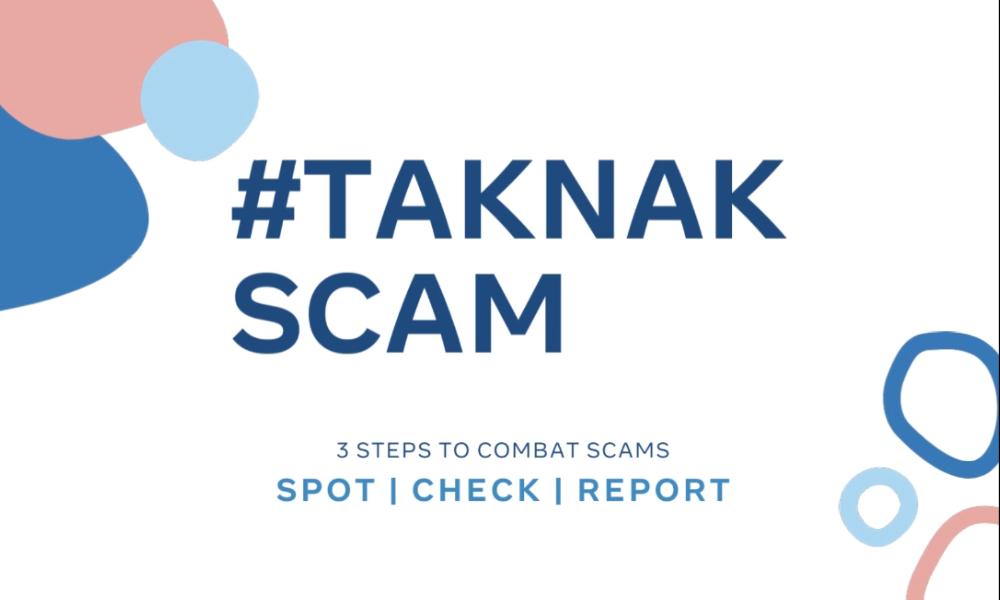In an effort to combat financial fraud, Facebook Malaysia and the police Commercial Crime Investigation Department (CCID) launched #TakNakScam, a nationwide anti-scam awareness campaign set to take place from July to September this year.
The three-month campaign is a joint effort with a few notable organisations, including the Malaysian Communications and Multimedia Commission (MCMC), Association of Banks in Malaysia (ABM) and the Federation of Malaysian Consumers Associations (Fomca), among others.
Facebook Malaysia’s interim country director Justin Murugaya said with scam cases on the rise, it was important for the public and private sectors, as well as interest groups, to come together and combat such crimes.
“Protecting the people's privacy is the right thing to do for our community and our business.
“We hope that the #TakNakScam campaign will help drive conversations among everyday Malaysians, to raise awareness, educate, encourage critical thinking and empower them to take action by reporting these scams to the relevant authorities.
“We also hope that this campaign will help support various government bodies, the financial sector, NGOs and the law enforcement goal in building and ensuring a safer online ecosystem in Malaysia,” Justin said during the virtual launch of the campaign today.
A total of 67,552 cyber scam cases were reported in Malaysia between 2017 and June 2021, amounting to a loss of RM2.23 billion.
Of the total, E-commerce scams top the chart with 23,011 cases, followed by 21,008 cases of illegal loans and 6,273 cases of investment scams.
The most prevalent types of financial scams include bank and identity impersonation; illegal loans; investment scams; e-commerce scams; money mulling and ATM card rentals; which are the key focus areas of this campaign.

Therefore, the #TakNakScam campaign calls for the public to remember three simple steps: “Spot, Check, Report” to stay vigilant in identifying, verifying and reporting financial scammers
i. Spot: Identify a suspicious activity;
ii. Check: Checking the said suspicious activity with authorities through official channels; and
iii. Report: Reporting the suspicious activity to the authorities
At a panel discussion following the campaign launch, CCID’s cybercrime and multimedia investigation deputy director Victor Sanjos said it was important for consumers to gain digital literacy to avoid and combat involvement in scams.
The head of the Bank Negara office in Penang, Hasjun Hisham, supported this stand by stating that consumers seeking finances have to be empowered with the knowledge of digital literacy as there are many preventative measures available to the public, yet they fail to identify how scams occur.
“Preventative (measures are) better than cure. We need to empower the financial consumer with knowledge (by) talking about digital literacy.
“Maybe you are actually (literate) in financial issues, but I think when it comes to digital literacy, there are many of us who still have insufficient information,” Hasjun said.
Digital literacy means having the skills to live, learn and work in a society where communication and access to information are increasing through digital technologies such as internet platforms, social media and mobile devices.
Perhaps digital literacy, she added, could be embedded into information technology modules or be deployed through extracurricular activities in the public school system, and that Bank Negara has been asking the Education Ministry to include a financial management module.
Consumers must keep adapting to emerging technologies
Asked about the common barriers of consumers protecting themselves from scamming techniques, Fomca deputy secretary-general Nur Asyikin Aminuddin said that it comes down to a lack of knowledge and the recent shift to online services caused by the pandemic.
She said consumers have to keep adapting to emerging technologies, which leave behind a vulnerable group of consumers from a different background knowledge that makes them susceptible to scams.
Nur Asyikin added that it would be important to direct this group to resources that allow them to report scams if they ever encounter them.
In addition to educating consumers about their rights, she also believes that online sellers should be educated about the Code of Business Conducts and Ethics based on the National Consumer Policy and ensure they are registered and regulated to prevent scammers using sales platforms.
The CCID advised members of the public to report any suspicious activity or financial fraud by filing a report or calling the CCID helplines at 03-26101559 and 03-26101599, which are available from 8am to 8pm, every day. - Mkini




No comments:
Post a Comment
Note: Only a member of this blog may post a comment.